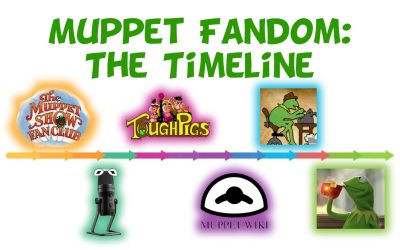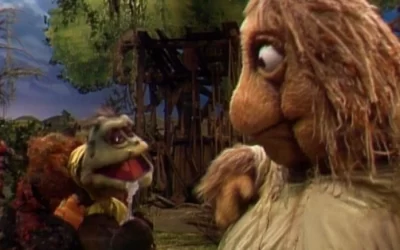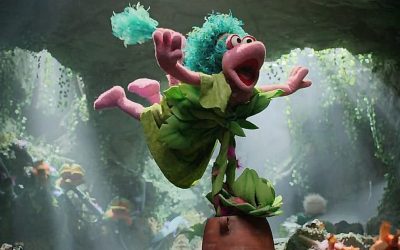Part 1 – Part 2
 The release of the epic coffee table book Sesame Street: A Celebration of Forty Years of Life on the Street is on the cusp of showing up on your doorstep (y’know, assuming you did the smart thing by pre-ordering it on Amazon.com). Rather than wait patiently on the stoop for the mailman, we took this opportunity to sit down for a chat with Louise Gikow, the book’s writer and editor.
The release of the epic coffee table book Sesame Street: A Celebration of Forty Years of Life on the Street is on the cusp of showing up on your doorstep (y’know, assuming you did the smart thing by pre-ordering it on Amazon.com). Rather than wait patiently on the stoop for the mailman, we took this opportunity to sit down for a chat with Louise Gikow, the book’s writer and editor.
Stop back around these parts later this week for part 2 of our chat with Louise, when we’ll be talking about her entire career with the Muppets. But for now, let’s learn a thing or two about her work on Sesame Street: A Celebration!
ToughPigs: Can you tell us about some of the research you had to do for the book?
Louise Gikow: I was very lucky because I was with Sesame Workshop, and I knew many of the people involved. Many of the puppeteers, a lot of the writers, we were in and out of each other’s pockets over the years, and I love them all dearly. So one of the things I did was talk to every person I possibly could on the staff. And really, that was most of the research I had to do. That and my own knowledge of everything. I knew Richard Hunt very well, I knew Jim, I knew Jon Stone. I did use the internet. I used, God bless you, your site and I used the Muppet Wiki a lot. And I have to say, it’s extraordinary what you guys do. I will tell you, people at the Workshop have gotten information about what the Workshop is going to do from you guys before they even knew it was happening. There’s a habit at the Workshop, it’s a very casual work environment, that when some people got hired, they didn’t even know they were hired until somebody mentioned to them a week before shooting, “Oh by the way, we’re sending you your ticket,” and it’s like “So I got the job?”

I had to use the obituaries, sadly much more than I wanted to. But the truth is that most of what I did was talk to people. And it’s ironic because some of my interviews will sound like interviews that have been done in the past because people tend to give the same interviews over and over again, but I got them from the horses’ mouths. I was lucky enough to work with Betsy Loredo, who is a wonderful editor, who did a tremendous amount of work on this book. We had a conversation years ago, and we both felt really strongly that we wanted the book to not be a tombstone on what maybe some people think is a show that is no longer being produced. And what I envisioned was pretty much what happened. That season, I went on set for many, many days, I’d get there before 9 and I left when everybody left, and I sat in a chair on the set, and I got to meet all the members of the staff that I’d seen but never got a chance to talk to, and I literally scribbled in my notebook constantly. I wanted to get a sense in the book about actual production. I wanted this to be a book that people who are interested in television production could read and get a sense of what the show’s production is about. I really wanted to pay tribute to the people on staff who were the unsung heroes, not just the puppeteers. The technical people, the lightning people, cameramen, and really make sure they all show up in the book.
TP: Did you collaborate at all with Michael Davis?
LG: No, that was a completely separate project, but I think we’re appearing on a couple panels together. Actually, I still have to read his book. I specifically didn’t read it because I didn’t want to be influenced by it. He was writing at the same time I was, and I really wanted it to be my voice and the voice of the people who were in it, and it was too close a timeline. But because the books were so close, I wanted them to be different. I really wish him the best, and I want his book to sell well, I want our book to sell well. I think if they’re different, they’ll support one another. I also think it’s great that he was able to express a different point of view and really go after a different aspect of the whole thing. It was more me staying out of his hair because he got his haircut first, so I can’t say he had to stay out of mine. When I first went on set, everyone said “I’ve already talked to somebody who’s doing a book.” And I said, “But you didn’t talk to me! Who is this person?” I didn’t know about [Street Gang], and neither did publishing because it was another division of Sesame that had given him access. But they got used to me because I just sort of sat around and was very nice and smiled a lot. I was very well-behaved.
TP: What were some of the most challenging parts of writing and editing the book?

LG: It’s probably more publishing stuff; I know you’re more interested in Workshop stuff. That part was not challenging, everybody was very generous with their time, everyone was really willing, the materials were unbelievably rich. The problem was that writing a book like this is chicken and egg. When I spoke with my editor, and knowing the Workshop like I do, I asked her how she wanted me to do it, because there is an enormous treasure trove of images and information and letters and memorabilia, but we didn’t know what they were yet. They weren’t accessible yet because we hadn’t begun the research process. Each chapter starts out with an on-set visit and something that relates to that chapter, either puppeteering or behind-the-scenes or licensing or whatever. That part I could write because it was fresh. But the rest of the book was based on things that we didn’t have available. Normally if you’re writing a big coffee table book on just about anything, you’d have the images already, and your writing would determine what images you used. I couldn’t do that because I never knew what images were available. So the biggest challenge was writing an entire manuscript of many hundreds of pages, and then completely rewrite it for the most part because of what we discovered. We wrote it first, and some of it stayed, but some of it was cut because we didn’t have images, but more importantly, more images became available and we had to rewrite to that. And up until the last minute, we were rewriting to things that were surfacing weeks before it was due.
TP: Did you have a favorite part of making the book?
LG: Talking to the people. I got a chance to meet a lot of people I’d heard about. Frank Biondo, Caroll Spinney I didn’t know well, a lot of the actors and actresses. But talking to everyone was so extraordinary. And having an excuse to spend four hours with Steve [Whitmire], who I never get to see. Spending a little more time with Matt Vogel, who I vaguely knew. Getting to know Joan [Ganz Cooney], who I had met but never really spoken with. I got to watch the older interviews done with the American Television Institute. I just loved it. It was one of the main reasons why I agreed to write the book. What a gift, to be able to spend your life near people like that. It’s like, how did I end up here by answering an ad in the New York Times? These are the greatest people. I work with geniuses, whatever that word means.
TP: What about your least favorite part?

LG: It had to be all of the people I didn’t meet. What I’m talking about is all the people who I didn’t get a chance to talk to. I mean, office managers from 1979. I send my thanks to everyone who was involved, all the people I couldn’t talk to as well as the ones I could, because every single one of them left a bit of themselves in the company and on the show.
TP: Was it difficult to find a balance in the book between the old years of Sesame Street and the new?
LG: Not really, no. I didn’t feel that there was. I’d like to think that I did a good job at keeping it balanced. Clearly there’s an awful lot of early stuff here, but I wanted to reflect what production is like right now and how it has changed.
One of the things I really wanted to do, and this is specifically to you and to [the Muppet Wiki] and all the fans out there, but I really wanted to put at least one thing in the book that you didn’t know, but I don’t know if I succeeded because you guys know everything! Many of the images I’m sure you’ve never seen, but I hope there’s at least a point of view or something that you guys will really like. It’s you guys who have kept it alive in an extraordinary way, and it’s humbling to everyone at the Workshop, and we admire you enormously. And it’s why I always felt that there was a little ToughPig sitting on my shoulder saying, is it good enough, is it original enough, is it unique enough, will you like it?
TP: I’m glad we were involved somehow! Was there anything in the book that you wanted to be in it, but had to cut?
LG: The truth of the matter is that you can’t include everything you want in a book like this. I wish I could have acknowledged every single person. Another thing that had to get cut was a lot of the on-set stuff. There were an awful lot of funny lines and interesting things that I had to let go of. I wrote a book that’s probably three times the length of the one that came out. But there’s nothing specific, nothing that stands out as a hole in the book.
TP: Since you’re one of a few people who has really delved into Sesame Street’s 40-year history recently, is there an era where you feel like the show was at its peak?
LG: Not really, no. The truth of the matter is that there are peak moments throughout. For example, there’s a description in the book of Jim and Frank in a recording session doing Bert and Ernie, and some of it was scripted and some of it was ad-libbed, and what comes out on the screen is just extraordinary. A couple of those moments with the kids, like Jon Jon, are just amazing moments. The sad moments, like Mr. Hooper, and the reveal of Snuffy. I like to think the show is sort of like a life. As a newborn, you take lots and lots of pictures, but less as it gets older. But that doesn’t mean that graduations and jobs and so many moments through a person’s life aren’t as important. The entire 40-year arc for me is a highlight.
 Click here for part two of our interview with Louise Gikow, where you’ll see Louise talk about her career writing for the Muppets!
Click here for part two of our interview with Louise Gikow, where you’ll see Louise talk about her career writing for the Muppets!
Click here to be the little ToughPig on Louise’s shoulder on the ToughPigs forum!



